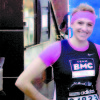Bombs to sheltering: ‘Feels like a lifetime since last Monday’ in Boston

Raymond native Katie Eastman, a reporter for the Boston Herald, reached mile 24 of the Boston Marathon when the bombs went off near the finish line. Her first thought was for her sister and parents who were to meet her there. She never got to finish the race.
By Gail Geraghty
Staff Writer
For two Raymond sisters and their parents, what was to have been a joyous reunion at the finish line of the Boston Marathon became an hour filled with shock and fear.
For a Lovell mother and her daughter, what was to have ended a week of visiting prospective colleges in Boston became a surreal day spent in lockdown while a massive police manhunt went on just five miles away.
Life turned on a dime when the two bombs exploded at Boston’s Copley Square April 15. For those who lived through the bombing and its aftermath, like third-time marathoner Katie Eastman, “everything changed.â€
Eastman, 23, a multimedia reporter at the Boston Herald who grew up in Raymond, had reached mile 24 in the race, feeling exhilarated at nearing the completion of “one of the happiest and most inspirational days of my life.†It was the first time she’d run with an official number, and she was also running to raise money for the Boston Medical Center. To make the moment even sweeter, her sister Jenna, who attends college in Boston, and their parents from Raymond, were all planning to meet up with her at the finish line.
Eastman said she began noticing as she ran that the police officers’ faces had turned serious, that they “weren’t high-fiving anymore.†And their walkie-talkies volume was on high.
“I asked a few of them what was going on. They said they didn’t know, and told me to keep running,†she said. She caught up with another runner who had a phone, whose son was meeting her at the finish line.
“Bombs went off. People are dead,†the woman told Eastman, who immediately started crying, thinking of her sister and parents. They raced for the finish line but were stopped at mile 25. Spectators offered her their cell phones to call her family, but, “Cell service was terrible. It took an hour for me to reach them. A long, terrible hour,†she wrote in a column that appeared in the next day’s Herald.
Meanwhile, Eastman’s sister Jenna and her roommates had just gotten off the Prudential Center T stop just minutes from the finish line, three minutes after the bombs went off. One of the roommates, Emily Dodge, also a Raymond resident and a third-year student at the Massachusetts College of Pharmacy, said they saw people sobbing as they walked toward the finish line.
“There was just so much panic. We had no idea, and I started asking people. There was rumor that two car bombs had gone off†in front of Lord & Taylor, where Jenna was supposed to meet her parents, Dodge said. Many tense moments ensued until Jenna was able to get through to her parents, who told them they had just got into Boston and were safe.
It was really scary. It was so surreal. It was incredible to think that this could be happening, and that the next bomb could be where we were,†said Dodge.
Jenna and Emily were also able to determine that Katie was safe, thanks to the tracker on her runner’s bib that the Boston Athletic Association provided to allow family and friends to track runners’ progress.
“They knew my pace — and knew it was very unlikely I ran the last two miles at top speed,†Katie said. But Katie had no such means of comfort in knowing her family was safe, that first hour after the blast. After being told she couldn’t finish the race, “I just started walking in the other direction, and ended up running because I was cold,†without access to her clothing, left at the finish line.
“After I finally knew my family was OK, I walked away from Copley Square in a daze. There was nothing else to do,†Katie said.
Jenna and Emily also “started walking very fast the other way,†said Dodge, going down streets where she’d never been before to take the fastest route away from where the bombs went off. I was just in shock that we were almost there,†said Dodge. “I was scared the whole week. I didn’t feel safe. It almost feels like a lifetime since last Monday.â€
Lockdown was scary, too

A Bridgton Transfer Station sticker shows on the right of Pam Ward’s windshield in this photo taken Wednesday by her daughter Zoe near Kenmore Square in Boston last Wednesday. The Lovell residents arrived in Boston shortly after the Boston Marathon bombings April 15 to visit colleges, but spent Friday in lockdown inside Pam’s mother’s home in Newton while police, federal agents, national guard troops and SWAT teams conducted a massive manhunt for one of the bombing suspects.
When Bridgton Books co-owner Pam Ward and her daughter Zoe, 16, arrived at her mother’s home in Newton, Mass., on Monday, they found her crying. Ward was immediately glad they’d picked last week to visit colleges in the city, so they could provide comfort to her mother, who lives alone in the suburb 10 minutes from downtown Boston.
“This has been hard for her. When you’re younger, you’re exposed to more,†Ward said.
By Wednesday, Ward said, the atmosphere in the city had begun to return to normal, and she took Zoe to a yoga class in Watertown, while she walked around the exact area where, the next night, police would hold a shootout with the two suspects identified as being responsible for the marathon bombings.
“It’s a very eerie feeling,†said Ward. “When you’re actually living it, as opposed to watching it on TV.â€
She spoke to the News on Friday afternoon as the entire city was in lockdown, with all buses, subways and cab services suspended, and all businesses closed while police, federal agents, national guard troops and SWAT teams enforced door-to-door searches of everyone’s home within a 20-block search perimeter centered just five miles away from her mother’s home.
“It’s been a crazy week,†she said. “The police called this morning at 7 a.m. My mother came and woke us up and said they’re asking everyone to stay home, and don’t look out their windows.â€
Ward said she wasn’t particularly shocked by the lockdown, which was termed as a “shelter in place†for the public’s safety during the search for Dzhokhar Tsarnaev, who was apprehended one block outside the search perimeter about an hour after the lockdown was lifted that evening. The other suspect, his older brother Tamerlan, died in the police shootout on Thursday, police said.
“I guess things don’t surprise you anymore, knowing what happened at the marathon,†she said. But the experience was “nerve-wracking,†nonetheless, she said. “There’s nobody out on the streets. I mean, this is a huge city, and the road my mother lives on is on the MTA (Massachusetts Transit Authority) route, and there’s usually people walking by. There is nobody out. It is isolated. This is not normal.â€
When a friend called from Maine asking if they’d cancelled the Bruins game, Ward realized it still hadn’t sunk in to the outside world just how unprecedented and total was the lockdown in Boston.
“I told her, ‘Why would you want to come here? There’s no way you could get in’,†said Ward.
As Ward described their day, spent mostly glued to the TV — “I keep trying to turn it off, but you become mesmerized,†she said — Zoe asked if she could go outside, just for a minute.
“Do you see anybody outside?†Ward said to her. “There’s your answer.†Turning back to the phone, Ward said, “People her age, they feel immortal. But I’m sure it’s been upsetting. Whether it’s going to affect her college choice is another matter.â€
Ward agreed that the lockdown in Boston was justified. “I sure wouldn’t want to get in the way of the police doing their job,†she said. “If you look at the perimeter, we’re all in an eight-mile radius. He could be anywhere.â€

